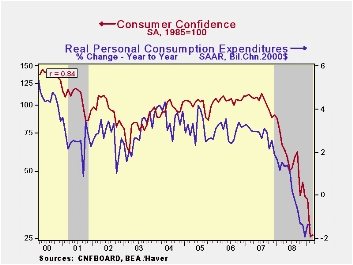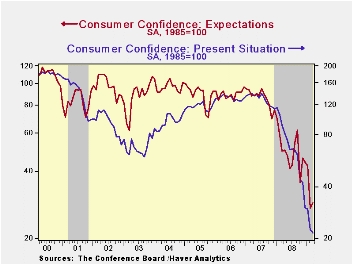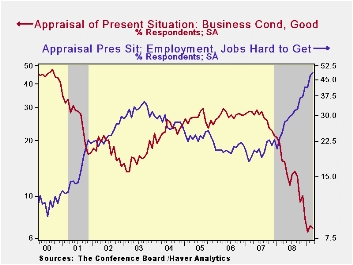 Global| Mar 31 2009
Global| Mar 31 2009U.S. Consumer Confidence Stabilizes Near Record Low
by:Tom Moeller
|in:Economy in Brief
Summary
The Conference Board reported that its March index of consumer confidence stabilized this month near its record low level reached during February. The reading of 26.0 was roughly stable with February but it left confidence three- [...]
 The Conference Board reported that its March index of consumer
confidence stabilized this month near its record low level reached
during February. The reading of 26.0 was roughly stable with February
but it left confidence three-quarters lower than the July 2007 peak.
The latest figure was slightly lower than Consensus expectations.
The Conference Board reported that its March index of consumer
confidence stabilized this month near its record low level reached
during February. The reading of 26.0 was roughly stable with February
but it left confidence three-quarters lower than the July 2007 peak.
The latest figure was slightly lower than Consensus expectations.
The Conference Board data can be found in Haver's CBDB database.
 During
the last ten years there has been an 86% correlation between the level
of consumer confidence and the y/y change in real consumer spending.
During
the last ten years there has been an 86% correlation between the level
of consumer confidence and the y/y change in real consumer spending.
Consumers' economic outlook improved slightly as indicated by a higher expectations index, but the latest reading made up little of February's more than one-third decline from January. The latest figure also was off by more than one-half from last February. The percentage of respondents expecting business conditions to worsen in six months was little changed at 39.1%, near the highest since 1974. Just 9.1% expected improvement in conditions. More jobs were expected by only 7.1% of respondents. As a result of that jobs outlook a near-record 23.9% foresaw less income. That was versus 15.0% last year and just 8.6% in 2007.
The present conditions index added 3.6% to the more-than one quarter February drop. It remained off more than three-quarters from a year earlier. Jobs were seen as hard to get by 48.7% of respondents, the highest (by just a bit) since 1992 and jobs were seen as plentiful by only 4.6%. Business conditions were seen as good by just 6.8% and that matched the 1991 low. Those who thought conditions were bad rose to 51.1%, the highest since 1983.
 Expectations for the inflation rate in twelve months have been roughly
stable since November at 5.9%. That's down from last year's high of
7.7%. Expectations about interest rates has started to sort out for an
increase with 35.6% of respondents expecting higher interest rates
while 29.7% expect rates to fall. A separate question indicated that a
near record 54.3% of respondents expected lower stock prices.
Expectations for the inflation rate in twelve months have been roughly
stable since November at 5.9%. That's down from last year's high of
7.7%. Expectations about interest rates has started to sort out for an
increase with 35.6% of respondents expecting higher interest rates
while 29.7% expect rates to fall. A separate question indicated that a
near record 54.3% of respondents expected lower stock prices.
The decline in overall consumer confidence over the last year has been greatest amongst higher income earners. It has been fairly uniform by age group.
| Conference Board (SA, 1985=100) | March | February | Y/Y % | 2008 | 2007 | 2006 |
|---|---|---|---|---|---|---|
| Consumer Confidence Index | 26.0 | 25.3 | -60.5 | 57.9 | 103.4 | 105.9 |
| Present Situation | 21.5 | 22.3 | -76.3 | 69.9 | 128.8 | 130.2 |
| Expectations | 28.9 | 27.3 | -52.6 | 50.0 | 86.4 | 89.7 |
Tom Moeller
AuthorMore in Author Profile »Prior to joining Haver Analytics in 2000, Mr. Moeller worked as the Economist at Chancellor Capital Management from 1985 to 1999. There, he developed comprehensive economic forecasts and interpreted economic data for equity and fixed income portfolio managers. Also at Chancellor, Mr. Moeller worked as an equity analyst and was responsible for researching and rating companies in the economically sensitive automobile and housing industries for investment in Chancellor’s equity portfolio. Prior to joining Chancellor, Mr. Moeller was an Economist at Citibank from 1979 to 1984. He also analyzed pricing behavior in the metals industry for the Council on Wage and Price Stability in Washington, D.C. In 1999, Mr. Moeller received the award for most accurate forecast from the Forecasters' Club of New York. From 1990 to 1992 he was President of the New York Association for Business Economists. Mr. Moeller earned an M.B.A. in Finance from Fordham University, where he graduated in 1987. He holds a Bachelor of Arts in Economics from George Washington University.
More Economy in Brief
 Global| Feb 05 2026
Global| Feb 05 2026Charts of the Week: Balanced Policy, Resilient Data and AI Narratives
by:Andrew Cates






